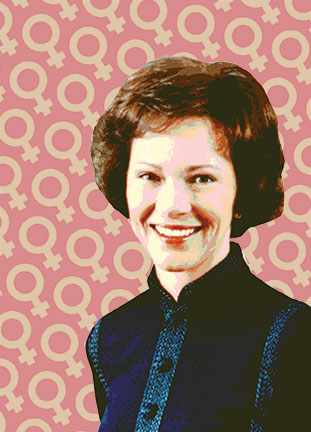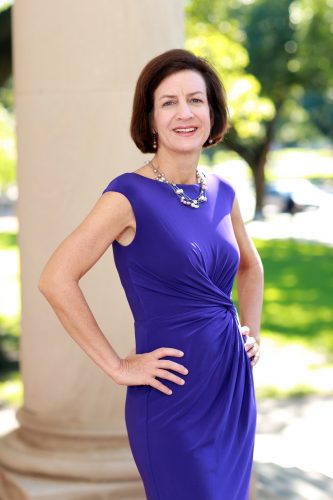Rosalynn Carter’s Southern Feminism
Religion professor Elizabeth Flowers explores the quiet fight for equal rights by the former first lady.

Rosalynn Carter views the failure to pass the Equal Rights Amendment as the biggest disappointment of her husband's presidency. (Photo Illustration by Tracy Sterling Bristol '80.)
Rosalynn Carter’s Southern Feminism
Religion professor Elizabeth Flowers explores the quiet fight for equal rights by the former first lady.
Rosalynn Carter and the Equal Rights Amendment
When feminists lobbied for constitutional protection of women’s rights in the late 1970s, they found a supporter in the White House. But the quiet impetus behind former President Jimmy Carter’s backing the Equal Rights Amendment was his wife, Rosalynn Carter.
“Rosalynn Carter was deeply invested in the struggle and fight for ERA,” said Elizabeth Flowers, associate professor of religion. “She views one of the biggest regrets of the Carter presidency, and her role in that, as the failure to pass the ERA.”
In 1972, before Carter’s presidency, Congress passed the Equal Rights Amendment, giving the states until 1979 to ratify it. Congress extended the deadline to 1982, but the amendment still fell three states short of adoption.
Flowers’ interest in Rosalynn Carter is personal and professional. A child of the 1970s, she grew up a Southern Baptist in Memphis, making the presidential election of Jimmy Carter — an evangelical symbol of the new South — a “big deal” to her family.
“My research has focused quite a bit on the 1970s and changing gender roles for women, particularly in the South,” said Flowers, who also is a faculty affiliate in TCU’s Women and Gender Studies program. “My last monograph looked at the Southern Baptist Convention as a case study for those changing roles, and the tensions and debates that came out of that, and the way they splintered the South, evangelicals and Southern Baptists. Jimmy Carter was a really significant part of the story, so I was always intrigued about Rosalynn’s role.”
As Flowers’ research for Into the Pulpit: Southern Baptist Women and Power since World War II (University of North Carolina Press, 2012) progressed, Rosalynn Carter’s name kept resurfacing — primarily as a target for the religious right. The professor said focusing on the former first lady after the book’s publication seemed natural.

Elizabeth Flowers grew up a Southern Baptist in Memphis. (Photo by Carolyn Cruz).
The Southern Baptist – Feminism Connection
A TCU grant allowed Flowers to conduct two research visits at the Jimmy Carter Presidential Library & Museum in Atlanta. Rosalynn Carter “wanted to present ERA in a way that would appeal to mothers, housewives and Southerners,” the professor said. “She felt like if they could win over this segment, then the ERA had a chance of passing.
“[Rosalynn Carter] wanted to temper down some of the more radical elements of feminism, as she saw it, and challenge what she felt were caricatures of the movement,” Flowers said. “She wanted to be sure that the struggle for ERA really appealed to mainstream America.”
The professor’s research on Rosalynn Carter is part of a larger book project she is working on with a group of scholars that will retell the history of the evangelical South from the perspective of women and issues of gender. They hope to have the manuscript finished in Spring 2016.
Flowers said some people assume that evangelical Southern Baptist women, such as Rosalynn Carter, were not natural allies of women’s rights. Through research, the professor hopes to show that evangelicalism and feminism are multilayered and diverse and that many evangelicals were on board with feminism in the 1970s.
“A lot of issues around the Equal Rights Amendment are still here with us today. So you can hear echoes of the 1970s, as so much of the rhetoric and discourse around these issues come from this earlier period,” Flowers said. “The tensions simply have not gone away, and in looking at Rosalynn, I find how much the past influences the way we talk about women, gender, feminism and issues of power in the present.”

Your comments are welcome
1 Comment
Related reading:
Features
Global Reconciliation via Skype
What Discovering Global Citizenship’s Virtual Voyage initiative taught students about forgiveness.
Campus News: Alma Matters, Research + Discovery
Should You Send Work Email After Hours?
Consider the possible emotional response first, says management scholar Bill Becker.